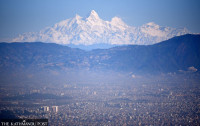Climate & Environment
Haze and fog blanket most of the country
Light rainfall likely in Karnali, Sudurpaschim and Gandaki provinces.
Post Report
Haze and fog covered almost all parts of the country on Monday, including the Kathmandu Valley. The meteorological office has predicted similar conditions for Tuesday as well.
According to the Meteorological Forecasting Division under the Department of Hydrology and Meteorology, shifts in the low pressure system to east from the west caused disturbances in the weather conditions.
“Some districts of Sudurpaschim, Karnali and Gandaki provinces will witness light rainfall on Monday night and Tuesday,” said Sanjeev Adhikari, a meteorologist at the division. “Snowfall will occur in some mountainous regions of the country.”
Most districts of the plains have been witnessing thick fog and mist for the last several days, which has affected daily lives and caused disturbances in vehicular movements.
Adhikari said currently there is no weather system in sight that would cause rainfall in the districts of Bagmati, Madhesh and Province-1.
The country has not witnessed any rainfall since the end of September last year.
The Department of Hydrology and Meteorology had earlier predicted low rainfall and above-average temperatures in most parts of the country between December 1, 2022 and February 28, 2023.
Lack of rainfall for a long time has been blamed for the worsening air quality in the Valley, which reached very unhealthy levels on Tuesday.
On Monday, the Kathmandu Valley’s air recorded an AQI (air quality index) figure of 285. As per the United States Environment Protection Agency’s air quality index, when air pollutant PM2.5 reaches 201 to 300 μg/m3, air quality is considered very unhealthy; everyone may experience problems, with sensitive groups experiencing more severe effects. Doctors suggest people of risk groups including children, pregnant women, elderly and those with respiratory illnesses, avoid all outdoor activities.
“Rise in the air pollution level affects all,” said Dr Niraj Bam, an associate professor at the Institute of Medicine, Tribhuvan University. “But those having underlying conditions—allergies, asthma and heart disease fall are the most vulnerable.”




 14.24°C Kathmandu
14.24°C Kathmandu









